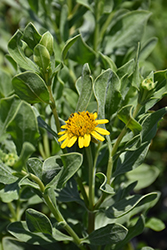It's all about ...
plants

Height: 4 feet
Spread: 3 feet
Sunlight:
![]()
Hardiness Zone: 8b
Other Names: Bushy Seaside Tansy, Sea Daisy
Description:
This vigorous. semi-evergreen variety is great for coastal planting with its ability to handle exposure to salt spray; perfect as a low hedge or filler plant; attractive silvery-green leaves and yellow daisy flowers that bloom all year in south Florida
Ornamental Features
Sea Ox-Eye features showy yellow daisy flowers with gold eyes at the ends of the branches from mid spring to late winter. It has grayish green foliage with hints of silver. The oval leaves remain grayish green throughout the winter.
Landscape Attributes
Sea Ox-Eye is a dense multi-stemmed evergreen shrub with an upright spreading habit of growth. Its average texture blends into the landscape, but can be balanced by one or two finer or coarser trees or shrubs for an effective composition.
This is a relatively low maintenance shrub, and should only be pruned after flowering to avoid removing any of the current season's flowers. It is a good choice for attracting birds, bees and butterflies to your yard. Gardeners should be aware of the following characteristic(s) that may warrant special consideration;
- Suckering
- Self-Seeding
Sea Ox-Eye is recommended for the following landscape applications;
- Mass Planting
- Hedges/Screening
- General Garden Use
- Groundcover
- Naturalizing And Woodland Gardens
Planting & Growing
Sea Ox-Eye will grow to be about 4 feet tall at maturity, with a spread of 3 feet. It has a low canopy. It grows at a slow rate, and under ideal conditions can be expected to live for approximately 8 years.
This shrub should only be grown in full sunlight. It is very adaptable to both dry and moist locations, and should do just fine under average home landscape conditions. It is considered to be drought-tolerant, and thus makes an ideal choice for xeriscaping or the moisture-conserving landscape. This plant should not require much in the way of fertilizing once established, although it may appreciate a shot of general-purpose fertilizer from time to time early in the growing season. It is not particular as to soil pH, but grows best in sandy soils, and is able to handle environmental salt. It is somewhat tolerant of urban pollution. This species is native to parts of North America..
This plant is not reliably hardy in our region, and certain restrictions may apply; contact the store for more information.
